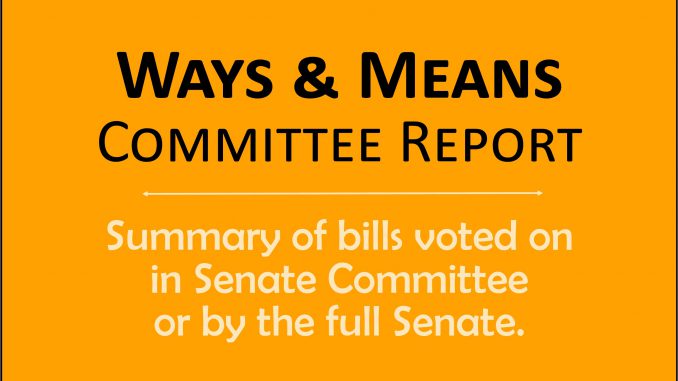
SF 236 – Legalizing consumer fireworks
SSB 1035 – Workforce Housing Tax Credit program set aside for small communities
COMMITTEE ACTION
SF 236 allows the commercial sale of fireworks. Currently, it is a simple misdemeanor to sell or use fireworks. However, a county board of supervisors or the Department of Natural Resources (DNR) may grant a permit for the display of fireworks by a competent operator.
The bill makes these changes:
- License and fees: The State Fire Marshal must establish a consumer fireworks seller license; and retailers and community groups must maintain commercial general liability insurance. The bill establishes two classes of consumer fireworks and five fee levels:
- $1,000 annual licensing fee for a retailer at a permanent building who devotes 50 percent or more of their floor space to sell or display first-class consumer fireworks.
- $500 annual licensing fee for a retailer at a temporary structure who devotes 50 percent or more their floor space to sell or display first-class consumer fireworks.
- $400 annual licensing fee for a retailer who devotes less than 50 percent of their floor space to sell or display first-class consumer fireworks.
- $400 annual licensing fee for a community group that sells first-class consumer fireworks.
- $100 annual licensing fee for retailers or community groups that sell only second-class consumer fireworks.
- Annual registration fee: An annual $1,000 wholesaler registration fee will be deposited in a consumer fireworks fee fund for the State Fire Marshal’s consumer fireworks duties, and to provide grants to local fire protection and emergency medical service providers.
- Timeline for selling: The State Fire Marshal must adopt rules to permit licensed retailers and community groups to sell fireworks at permanent buildings June 1 to 8 and December 10 to January 3, and at temporary structures from June 13 to July 8.
- Time for setting off: People may set off fireworks between 9 a.m. and 10 p.m. from June 1 to July 8 and from December 10 to January 3. A person can only set off fireworks on their own land or with permission of the landowner. A violation is a simple misdemeanor, but a court cannot order imprisonment.
- Underage buying/selling: Selling a consumer firework to a person under 18 is a simple misdemeanor. The underage buyer also commits a simple misdemeanor, which is generally punishable by confinement for no more than 30 days, a fine of at least $65 but not more than $625, or by both. However, this bill provides for a fine of at least $250.
- Restrictions/opt out: The State Fire Marshal may suspend the use of consumer fireworks, display fireworks or novelties if their use would be a threat to public safety. Penalty: a simple misdemeanor with at least a $250 fine. A county board of supervisors or city council may adopt an ordinance or resolution to prohibit or limit the use (but not the sale) of consumer fireworks or display fireworks if they would be a threat to public safety or a nuisance. Penalty: simple misdemeanor and $250.
- Key differences from last session’s legislation:
- Fee schedule on Page 2, lines 24-35 and Page 3, lines 1-2: different references (retailer at permanent building vs. temporary structure) and fee amounts
- Page 3, lines 21-25: insurance coverage requirements and amounts are different
- Sections 6 and 7 on page 7: Opt-out language instead of opt-in language for county board of supervisors and city councils
- Page 10, lines 1-16: rephrasing of selling/use dates and timeframes
- Page 11, Division III: separate effective date division instead of having two effective date sections
[3/8: 10-5 (Bolkcom, Jochum, McCoy, Petersen, Quirmbach “no”)]
SSB 1035 sets aside a pool of $10 million in tax credits under the Workforce Housing Incentive Program for projects in communities located outside of the 11 most populated counties in the state. The 11 most populated counties include all major metropolitan areas plus their suburbs and ring cities.
To accommodate the new $10 million set aside, the total amount of incentives available under the program is increased to $30 million from the current $20 million level. If the new $10 million set aside for smaller communities is not used, the remaining amount may fund projects located in the 11 largest counties in the state. The incentive program has reached its maximum $20 million tax credit allocation for FY17 and FY18.
The committee adopted an amendment designed to ensure that the increase to the Workforce Housing Tax Credits available does not result in an increase in the overall amount of tax credits issued by Iowa’s Economic Development Authority and negatively impact revenue in the state’s General Fund.
[3/8: 12-3 (Bolkcom, McCoy, Petersen “no”)]
